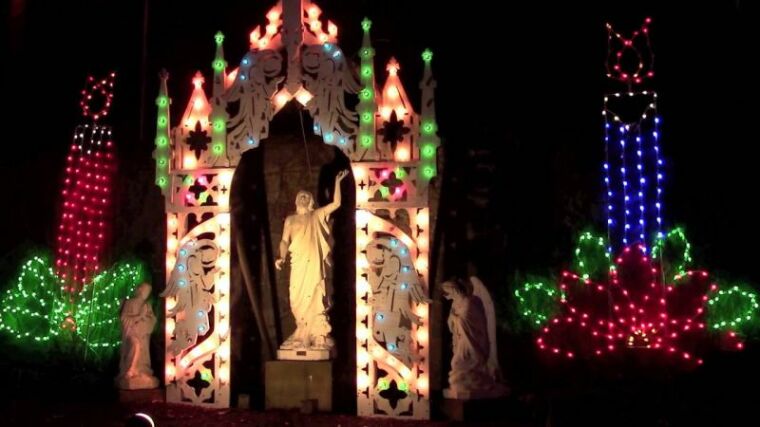Massachusetts high court orders Catholic retreat center to pay taxes

Massachusetts' highest court has ruled that a popular Catholic retreat center that serves as a wildlife sanctuary and a home for battered women must pay taxes.
The Massachusetts Supreme Judicial Court stated in its ruling on Wednesday that parts of the National Shrine of Our Lady of La Salette campus are subject to taxation as they do not fulfill a religious role.
The 199-acre campus, located in the southeastern Massachusetts city of Attleboro includes a chapel, a retreat house and a popular exhibit of Christmas lights that attracts tens of thousands of visitors each year.
The shrine stated that the full campus is used for religious purposes, and it has not paid property taxes in decades. However, in 2013, town officials said that four parts of the campus, including a welcome center, maintenance shed, as well as the wildlife refuge and shelter, should be taxed as they were not used for religious purposes. The full value of the campus was assessed at $13 million, about $5 million of which was taxable.
The religious order paid the tax bill amounting to $92,000, but it turned to the courts to argue their case, America Magazine reported. The ruling on Wednesday was split, with the court stating that two of the four areas should be taxed.
The court stated that the town incorrectly taxed the welcome center and the maintenance shed, which the justices said were used to carry out the shrine's religious worship and educational programs. The justices also noted that areas such as parking lots and fellowship halls have been historically exempt from property taxes even though they are not used for worship.
Diane Tillotson, a lawyer representing the shrine, considered the justices' decision on that front as a victory.
"If you start looking at the activities in the church basement and saying, 'Well, you host coffee hour there and that's not really religious worship, so we're going to tax you for that portion of the building,' that could be devastating for churches throughout the commonwealth," Tillotson said.
The city's bid to tax the shrine's gift shop and cafeteria was also rejected by the court.
"The fact that money earned from the cafeteria, bistro, and gift shop may help pay for the Shrine's expenses does not remove them from the realm of religious worship and instruction. Even a church cannot live on prayer alone," the justices wrote in their decision.
The court ruled in favor of the town when it came to the wildlife refuge and shelter, noting that the two areas were eligible for taxation because they were used for charitable purposes not associated with religion.
Tillotson and Cyriac Mattathilanickal, the priest who runs the shrine's retreat center, said that they do not agree with the court's characterization of charity being distinct from religion, but they stated that the shrine would still comply with the ruling.
Local religious leaders, including Protestants, Jews, and Muslims, have filed a legal brief in support of the retreat center.
 Christians don't have to affirm transgenderism, but they can’t express that view at work: tribunal
Christians don't have to affirm transgenderism, but they can’t express that view at work: tribunal Archaeology discovery: Medieval Christian prayer beads found on Holy Island
Archaeology discovery: Medieval Christian prayer beads found on Holy Island Presbyterian Church in America votes to leave National Association of Evangelicals
Presbyterian Church in America votes to leave National Association of Evangelicals Over 50 killed in 'vile and satanic' attack at Nigerian church on Pentecost Sunday
Over 50 killed in 'vile and satanic' attack at Nigerian church on Pentecost Sunday Ukrainian Orthodox Church severs ties with Moscow over Patriarch Kirill's support for Putin's war
Ukrainian Orthodox Church severs ties with Moscow over Patriarch Kirill's support for Putin's war Islamic State kills 20 Nigerian Christians as revenge for US airstrike
Islamic State kills 20 Nigerian Christians as revenge for US airstrike Man who served 33 years in prison for murder leads inmates to Christ
Man who served 33 years in prison for murder leads inmates to Christ


 Nigerian student beaten to death, body burned over ‘blasphemous’ WhatsApp message
Nigerian student beaten to death, body burned over ‘blasphemous’ WhatsApp message 'A new low': World reacts after Hong Kong arrests 90-year-old Cardinal Joseph Zen
'A new low': World reacts after Hong Kong arrests 90-year-old Cardinal Joseph Zen Iran sentences Christian man to 10 years in prison for hosting house church worship gathering
Iran sentences Christian man to 10 years in prison for hosting house church worship gathering French Guyana: Pastor shot dead, church set on fire after meeting delegation of Evangelicals
French Guyana: Pastor shot dead, church set on fire after meeting delegation of Evangelicals ‘Talking Jesus’ report finds only 6% of UK adults identify as practicing Christians
‘Talking Jesus’ report finds only 6% of UK adults identify as practicing Christians Mission Eurasia ministry center blown up in Ukraine, hundreds of Bibles destroyed: 'God will provide'
Mission Eurasia ministry center blown up in Ukraine, hundreds of Bibles destroyed: 'God will provide' Church holds service for first time after ISIS desecrated it 8 years ago
Church holds service for first time after ISIS desecrated it 8 years ago Burger King apologizes for 'offensive campaign' using Jesus' words at the Last Supper
Burger King apologizes for 'offensive campaign' using Jesus' words at the Last Supper Uganda: Muslims abduct teacher, burn him inside mosque for praying in Christ’s name
Uganda: Muslims abduct teacher, burn him inside mosque for praying in Christ’s name